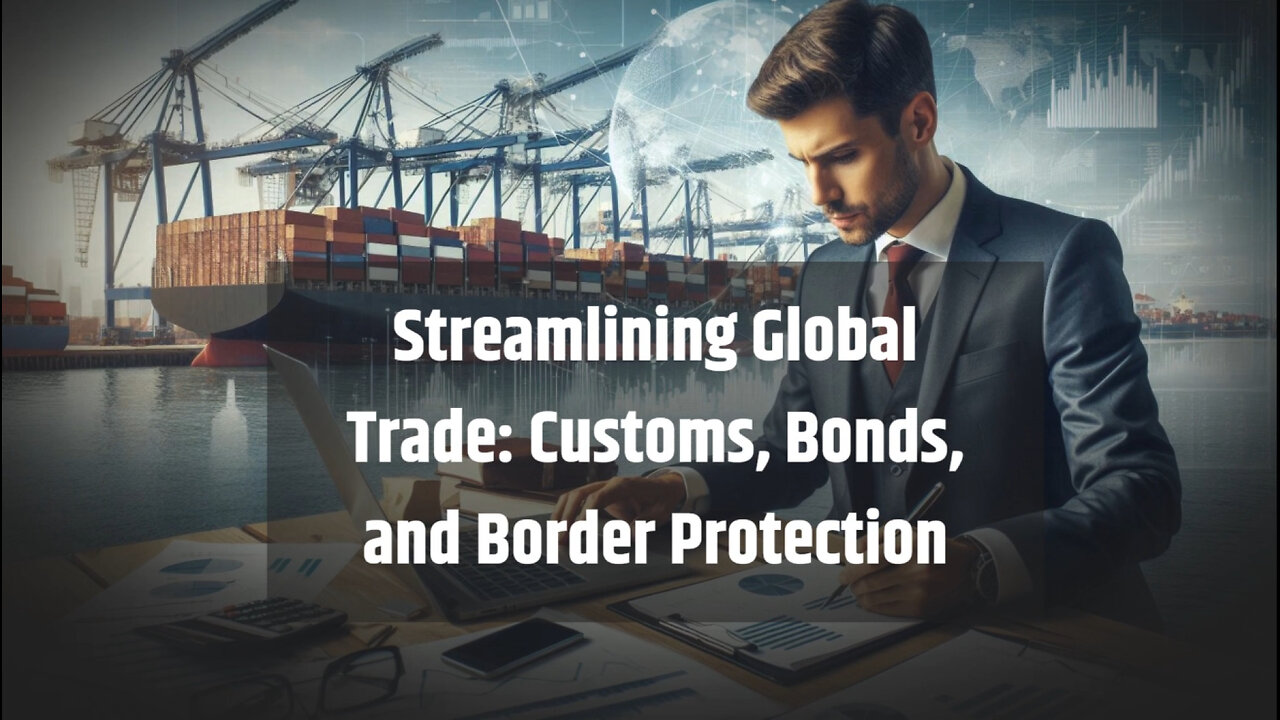Premium Only Content

Unlocking International Trade: A Closer Look at Customs and Border Protection
ISF Depot // 661-246-8217 // customs@isfdepot.com // www.isfdepot.com
Customs brokerage is a critical aspect of international trade, acting as a bridge between importers and government authorities. Its main function is to facilitate the clearance of goods through customs by preparing and submitting the required documents, calculating duties and taxes, and ensuring compliance with the necessary regulations. Customs brokers possess a deep understanding of trade policies, customs regulations, and documentation requirements, which enables them to navigate the complex process of importing goods.
One key aspect of customs brokerage is the provision of customs bonds. A customs bond is a financial guarantee that ensures compliance with customs regulations and obligations. It serves as a form of insurance for the government, protecting against potential financial loss resulting from the violation of customs laws or regulations. Customs bonds are required for certain types of imports, particularly for goods valued above $2,500. Importers can obtain customs bonds from surety companies or through licensed customs brokers, who have the expertise to guide them through the process.
Another important consideration in customs brokerage is Importer Security Filing (ISF), also known as 10+2. ISF is a mandatory filing requirement for importers shipping goods to the United States by ocean. It requires importers or their agents to provide specific information about the shipment to the US Customs and Border Protection (CBP) before the goods are loaded onto a vessel. The goal of ISF is to enhance supply chain security by allowing CBP to identify and mitigate any potential risks associated with the imported goods.
The field of customs brokerage operates within the larger context of international trade. The exchange of goods and services between different countries is essential for the global economy, but it is subject to various regulations, tariffs, and trade policies. These measures are implemented by countries to protect domestic industries, ensure public safety, and maintain fair competition. Customs and Border Protection agencies play a vital role in enforcing these regulations at ports, airports, and borders, facilitating the movement of goods while safeguarding against illegal activities.
Customs and Border Protection officers are responsible for inspecting shipments, enforcing customs laws, and assessing duties and taxes. They have the authority to seize illegal goods and verify the accuracy of import documentation. Their role is crucial in maintaining the integrity of international trade and ensuring compliance with regulations.
In conclusion, customs brokerage, customs bonds, Importer Security Filing, and the role of Customs and Border Protection are all interconnected elements of international trade. They contribute to the smooth flow of goods across borders, facilitate secure supply chains, and ensure compliance with regulations. Customs brokers play a crucial role in navigating the complexities of importing goods, providing expertise in customs regulations, documentation, and compliance. Understanding these concepts is vital for businesses engaged in international trade to ensure smooth operations and minimize delays.
#usimportbond #isfcustomsbroker #uscustomsclearing #isfentry
Video Disclaimer Here: This tutorial is independent and not affiliated with any US governmental entities.
-
 1:05:19
1:05:19
Sarah Westall
12 hours agoDying to Be Thin: Ozempic & Obesity, Shedding Massive Weight Safely Using GLP-1 Receptors, Dr. Kazer
104K25 -
 54:38
54:38
LFA TV
1 day agoThe Resistance Is Gone | Trumpet Daily 12.26.24 7PM EST
70.5K12 -
 58:14
58:14
theDaily302
21 hours agoThe Daily 302- Tim Ballard
67.4K13 -
 13:22
13:22
Stephen Gardner
15 hours ago🔥You'll NEVER Believe what Trump wants NOW!!
115K336 -
 54:56
54:56
Digital Social Hour
1 day ago $11.95 earnedDOGE, Deep State, Drones & Charlie Kirk | Donald Trump Jr.
65.7K6 -
 DVR
DVR
The Trish Regan Show
16 hours agoTrump‘s FCC Targets Disney CEO Bob Iger Over ABC News Alleged Misconduct
69.7K43 -
 1:48:19
1:48:19
The Quartering
17 hours agoElon Calls White People Dumb, Vivek Calls American's Lazy & Why Modern Christmas Movies Suck!
150K114 -
 2:08:42
2:08:42
The Dilley Show
18 hours ago $37.51 earnedH1B Visa Debate, Culture and More! w/Author Brenden Dilley 12/26/2024
128K44 -
 4:55:59
4:55:59
LumpyPotatoX2
20 hours agoThirsty Thursday on BOX Day - #RumbleGaming
116K9 -
 1:04:52
1:04:52
Geeks + Gamers
19 hours agoDisney RATIO'D on Christmas Day | Mufasa Embarrassed By Sonic 3
84.8K13